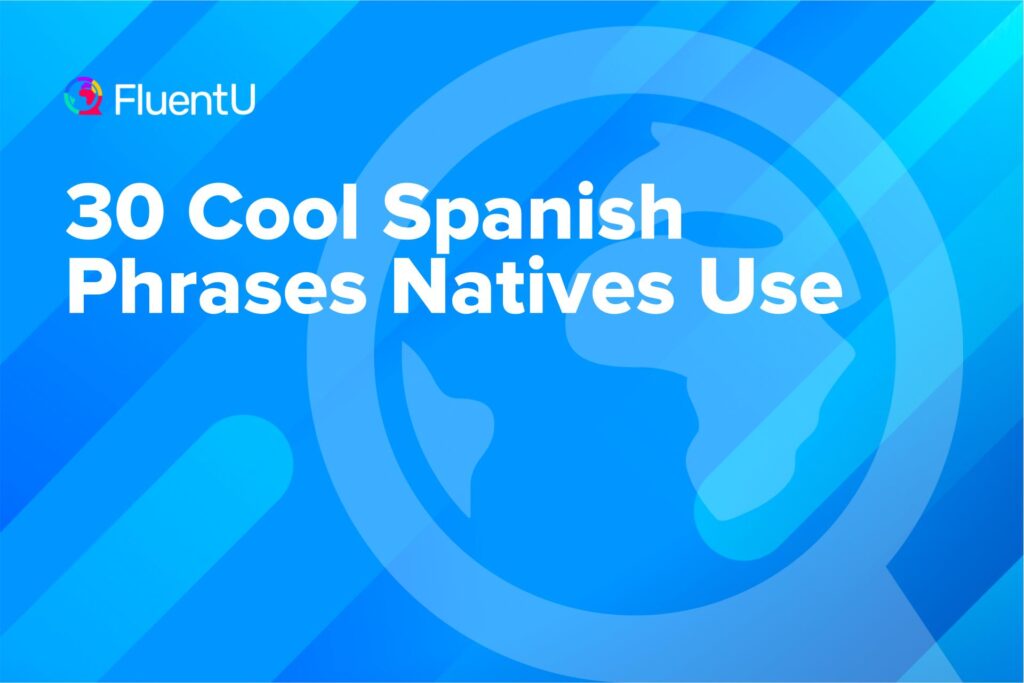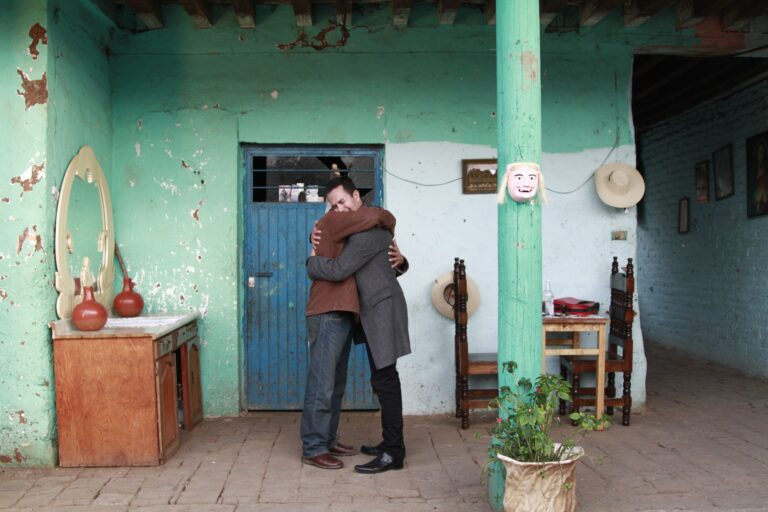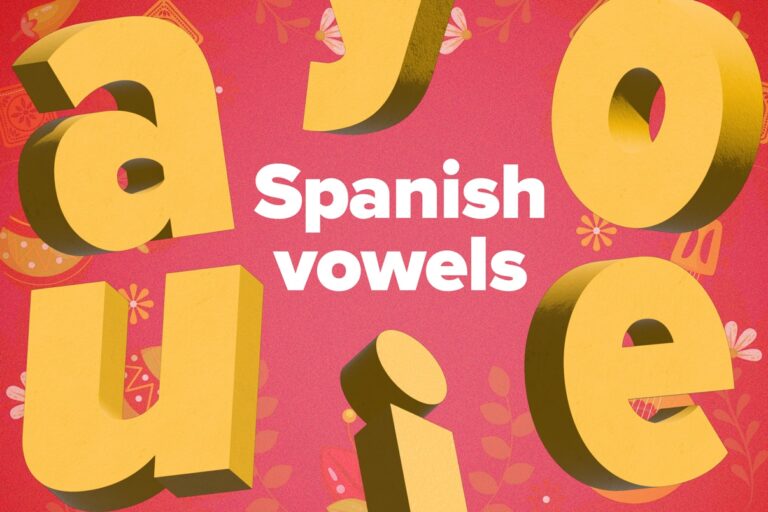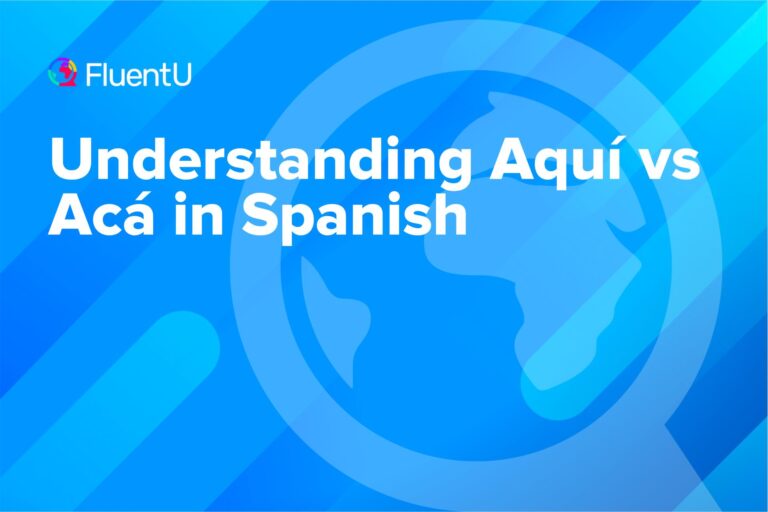Contents
- 1. ¿Qué onda? (What’s up?)
- 2. Buena onda (Good vibes)
- 3. Venga, hombre (Come on, man)
- 4. Bajar un cambio (To calm down)
- 5. Órale (Yeah/Wow/etc.)
- 6. ¡No manches! (No way!)
- 7. ¡Que pedo! (What’s up?/What’s the matter/problem?)
- 8. ¡Qué barbaridad! (How awful!/That’s ridiculous!)
- 9. ¡Qué bárbaro! (Cool!/That’s great!/Wow!/How sad!)
- 10. Tranquilo / Tranquila (Calm down/Don’t worry)
- 11. Buenazo / Buenaza (Really good/cool)
- 12. Estoy enganchado / enganchada (I’m hooked)
- 13. Por si las moscas (Just in case)
- 14. Plantar un pino (To poop)
- 15. Tener mono (To have withdrawals/To miss/To want)
- 16. Echar una mano (To lend a hand)
- 17. Ponerse (las) pilas (To pay attention/To watch out/etc.)
- 18. Meter la pata
- 19. Tomar el pelo (To pull one’s leg)
- 20. Mala leche (Bad intentions)
- 21. Pura vida (Pure life/Simple life)
- 22. Ser una pasada (To be cool)
- 23. Me mola (I like/enjoy)
- 24. ¡Qué chévere! (That’s cool!)
- 25. Súper bien (Great)
- 26. Pecueca (The smell of stinky feet)
- 27. Ensimismado/ Ensimismada (Lost in thought)
- 28. Merendar (To have a light meal or snack)
- 29. Botellón
- 30. Sobremesa
- And One More Thing…
30 Cool Spanish Phrases Natives Use

To really connect with and understand native speakers, you have to go beyond your textbook Spanish. There are many cool phrases and expressions used all over the Spanish-speaking world, and learning this vocabulary will take you to another level of proficiency and allow you to engage in more conversation.
In this post, you’ll learn 30 cool Spanish phrases with their regional specifications so you can communicate no matter where you find yourself.
Download: This blog post is available as a convenient and portable PDF that you can take anywhere. Click here to get a copy. (Download)
1. ¿Qué onda? (What’s up?)
While this phrase translates directly to “What wave?” it can be used in place of “What’s up?” This one is mostly used in Mexico and a few nearby Latin American countries.
¡Hola, linda! ¿Qué onda? (Hey, beautiful! What’s up?)
2. Buena onda (Good vibes)
Translating directly to “good wave,” this one is most similar to “good vibes” and can also mean “cool.” It’s often used to describe a person or place. Mala onda can be used to say the opposite.
This is another one that is mostly centered around Mexico.
Él es muy buena onda, seguro me dice que sí. (He’s really cool, I’m sure he’ll say yes.)
3. Venga, hombre (Come on, man)
You might say this if someone is being slow or “yanking your chain.” Since it’s a pretty basic phrase, it can be used in most Spanish-speaking countries, although it’s mostly heard in Spain.
¡Venga, hombre, no te quedes en casa todo el finde! (Come on, man, don’t stay at home all weekend!)
4. Bajar un cambio (To calm down)
Translating literally to “lower a gear,” this one can be used to tell someone who seems uptight or tense to calm down, similar to saying “take it easy” or “chill out.” It can also be used in a positive way to mean “slow down” or “de-stress.”
It’s used most frequently in Argentina.
Mi jefe siempre está estresado. Necesita bajar un cambio. (My boss is always stressed. He needs to chill out.)
5. Órale (Yeah/Wow/etc.)
This word can be used in a few different ways, but most often it’s used to agree to something (like “Yeah!” or “Right on!”), encourage someone (like “Come on!”), or express surprise (like “No way!” or “Wow!”). It’s usually said with great enthusiasm, and mostly by Mexicans.
In Argentina and some other Spanish-speaking countries, dale is a word used similarly to this.
¡Órale! Llevamos una hora esperándote! (Come on! We’ve been waiting for you for an hour!)
6. ¡No manches! (No way!)
Another primarily Mexican phrase, you can use this one if you think someone is playing around or if they say something surprising. You can also use it as an expression of disappointment, anger or frustration.
¿En serio vas a mudarte a Colombia? ¡No manches! (Are you really going to move to Colombia? No way!)
7. ¡Que pedo! (What’s up?/What’s the matter/problem?)
Pedo means “fart,” but this slang phrase is a common way to ask someone what’s up in Mexico. With a different tone, it can also have a more serious meaning, like “What’s the matter?” or “What’s your problem?”
¡Que pedo, guey! ¿Cómo has estado? (What’s up, buddy! How’ve you been?)
8. ¡Qué barbaridad! (How awful!/That’s ridiculous!)
Since this one is a pretty direct translation, it’s used in many regions. It literally means “What barbarity!” and is used similarly to “That’s ridiculous!” “That’s crazy” or “How awful!”
¿Te cobraron seis dolares por un café? ¡Qué barbaridad! (They charged you $6 for a coffee? That’s ridiculous!)
9. ¡Qué bárbaro! (Cool!/That’s great!/Wow!/How sad!)
This one sounds a lot like the last one, but in this case bárbaro (barbaric) is used in Argentina either to describe something cool/ great, or as an expression of surprise, sadness or horror.
Qué bárbaro es su carro. (His car is so cool.)
¿Te enteraste del accidente? ¡Qué bárbaro! (Did you hear about the accident? How awful!)
10. Tranquilo / Tranquila (Calm down/Don’t worry)
This word means “calm.” It can be used to tell someone to calm down or not to worry. The way it’s used colloquially can vary from country to country, but they’re all similar variations.
If you’re talking to a male, you’d use tranquilo, while tranquila is for a female. In some places, it’s common to hear the shortened version, tranqui to mean “chill.”
Tranquilo, no pasa nada. Podemos tomar el próximo bus. (Don’t worry, it’s fine. We can take the next bus.)
Hagamos algo tranqui en mi casa esta noche. (Let’s do something chill at my house tonight.)
11. Buenazo / Buenaza (Really good/cool)
Buenazo is a combination of the adjective bueno and the augmentative suffix -azo. You can use it to describe food, objects, places, etc. that you find really cool or good.
La comida en este restaurante es buenazo. (The food at this restaurant is really good.)
12. Estoy enganchado / enganchada (I’m hooked)
This phrase can be used to say that someone is “hooked on” or “addicted to” a TV show, snack or something similar.
Estoy enganchada a esta serie. (I’m hooked on this series.)
13. Por si las moscas (Just in case)
Translating directly to “just in case the flies,” this old Spanish idiom is used similarly to how we say “just in case.” If you’re doing something that seems superfluous or unnecessary, this expression may be used as an explanation.
Lleva un paraguas por si las moscas. (Bring an umbrella, just in case.)
14. Plantar un pino (To poop)
This is a funny metaphor that translates to “plant a pine,” but actually means “to poop.” You can also use hacer caca or hacer el número dos, which is the same as we say “take a #2.”
The more formal way to say it is defecar or ir de cuerpo.
Vaya, me pasó directo esa comida. Voy a plantar un pino. (Man, that food went straight through me. I’m going to go take a dump.)
15. Tener mono (To have withdrawals/To miss/To want)
This is an expression that can be used to say you really want something after a period of abstinence from it, similar to having withdrawals. It can also mean you really miss someone or feel like doing something. It literally means “to have monkey.”
This one is heard mostly in Spain.
Tengo mono de un café. (I’m dying for a coffee.)
Tengo mono de ti. (I really miss you.)
16. Echar una mano (To lend a hand)
Echar una mano means “to lend a hand” or “to help out.” Echar is a versatile verb that means “to throw” or “to cast” on its own, but it’s used in a few Spanish expressions with differing meanings. For example, echar un vistazo means “to take a look.”
Necesito mover este sofá. ¿Puedes echar una mano? (I need to move this couch. Can you lend a hand?)
17. Ponerse (las) pilas (To pay attention/To watch out/etc.)
This phrase literally means “to put in (the) batteries,” and it’s used in various ways including telling someone to watch out/be alert, to pay attention, to look alive or to get to work.
In some places like Ecuador, it’s even used to communicate to a friend that you’re going to make plans in the future:
Oye, ponte pilas para esa parillada. (Hey, get ready for that BBQ.)
¡Pónganse las pilas! Esto va a estar en la prueba. (Pay attention! This is going to be on the test!)
18. Meter la pata
Literally translating to “to put in the paw,” this phrase basically means “to mess up.” It’s somewhat similar to the English saying “to put your foot in your mouth,” but it doesn’t always have to do with saying the wrong thing.
Metimos la pata al comprar este carro. (We made a mistake when we bought this car.)
19. Tomar el pelo (To pull one’s leg)
In Spanish, this idiom uses hair instead of leg, but the meaning is the same. You can use this when you’re teasing someone or lying to them in a playful way.
No olvidé mi pasaporte…solo estaba tomándote el pelo. (I didn’t forget my passport…I was just pulling your leg.)
20. Mala leche (Bad intentions)
Depending on where you’re at, the meaning of this one can change slightly. Translating directly to “bad milk,” it usually means something along the lines of being “pissed off,” bad-tempered or having ill intentions.
Used in quite a few Spanish-speaking regions, it’s often attributed to a person:
Ella tiene mala leche. (She has a bad temper.)
Ella lo hizo con mala leche. (She did it with bad intentions.)
You can also call someone un/una malaleche to say that they have bad intentions or are not a good person.
21. Pura vida (Pure life/Simple life)
This is Costa Rica’s signature phrase and they use it often, claiming that it’s not just a saying but a way of life. It refers to living a good, simple life, being grateful for what we have and appreciating the little things and the beauty in our lives.
They use it to say hello, to say goodbye, to say thanks, as a response to something they find cool…pretty much for anything.
¡Hasta luego! (See you later!)
22. Ser una pasada (To be cool)
This phrase can be heard in Spain. Una pasada is used for both masculine and feminine nouns.
Esta canción es una pasada. (This song is cool).
23. Me mola (I like/enjoy)
You can say me mola (or me molan ) to say that you like or enjoy something(s). Molar is also used as a verb to say that something is cool.
Me mola esta banda. (I like this band)
Ellos molan mucho. (They’re really cool.)
24. ¡Qué chévere! (That’s cool!)
This phrase is widely used in Latin America, especially in Ecuador, Colombia, Venezuela and Peru. Chévere can be used to describe anything you find cool, including people.
¡Qué chévere tu camiseta! (Your T-shirt is so cool!)
Other Spanish words for “cool” include guay (Spain), chido (Mexico) and copado (Argentina).
25. Súper bien (Great)
The phrase súper bien means something like “great,” “excellent” or “super cool.” It’s widely used and will be understood wherever you are in the Spanish-speaking world.
Te va a ir súper bien. (You’re going to do great.)
26. Pecueca (The smell of stinky feet)
This word, and the following four words, are especially cool because they don’t have an English translation. Many words are absent from the English language but would be incredibly useful.
One of these is pecueca, which is a word commonly used in Colombia.
Ponte zapatos, hombre. La pecueca es muy fuerte. (Put on shoes, man. The stinky-feet smell is very strong.)
27. Ensimismado/ Ensimismada (Lost in thought)
This adjective comes from the verb ensimismarse. In addition to being “lost in thought,” it can also mean “engrossed,” “caught up” or “preoccupied.”
28. Merendar (To have a light meal or snack)
This is an irregular verb that means eating a light meal or a snack, typically in the afternoon or early evening. This is a very common thing to do in Spain.
¿Quieres merendar? (Do you want to have a snack?)
In some countries, it refers to having a casual or light dinner. This is common in Spanish-speaking countries where lunch is typically the biggest meal.
Normalmente meriendo alrededor de las 7. (I usually have dinner around 7 p.m.)
The noun is merienda (snack/light meal).
29. Botellón
This one translates to “big bottle,” but is more often used to refer to when a group of young people gather outdoors and drink large amounts of alcohol.
This typically happens at night and out in the street where they don’t have to pay for expensive drinks from a bar. It’s a common thing in Spain.
¿Vas al botellón esta noche? (Are you going to the “botellón” tonight?)
30. Sobremesa
This is a very specific word for the time when everyone has finished dinner (or lunch), but is still seated at the table, engaged in group conversation.
This is especially common in Spain and explains why you won’t get the check immediately after you finish a meal at a restaurant—it would be considered rude to rush you or discourage spending plenty of time digesting, relaxing and enjoying your company.
While it literally translates to “over the table,” there’s no word for this concept in English (but there should be!).
Mi parte favorita de cenar con mi familia es la sobremesa. (My favorite part of having dinner with my family is the “sobremesa.”)
To practice this new vocabulary and learn more cool Spanish words and phrases, you can watch a Spanish series or add some Spanish-language music to your playlist.
You can also try a language learning program like FluentU—it’s got a lot of video content where you can see Spanish slang in action, plus tools to help you commit it to memory.
FluentU takes authentic videos—like music videos, movie trailers, news and inspiring talks—and turns them into personalized language learning lessons.
You can try FluentU for free for 2 weeks. Check out the website or download the iOS app or Android app.
P.S. Click here to take advantage of our current sale! (Expires at the end of this month)

Download: This blog post is available as a convenient and portable PDF that you can take anywhere. Click here to get a copy. (Download)
And One More Thing…
If you've made it this far that means you probably enjoy learning Spanish with engaging material and will then love FluentU.
Other sites use scripted content. FluentU uses a natural approach that helps you ease into the Spanish language and culture over time. You’ll learn Spanish as it’s actually spoken by real people.
FluentU has a wide variety of videos, as you can see here:

FluentU brings native videos within reach with interactive transcripts. You can tap on any word to look it up instantly. Every definition has examples that have been written to help you understand how the word is used. If you see an interesting word you don’t know, you can add it to a vocab list.

Review a complete interactive transcript under the Dialogue tab, and find words and phrases listed under Vocab.

Learn all the vocabulary in any video with FluentU’s robust learning engine. Swipe left or right to see more examples of the word you’re on.

The best part is that FluentU keeps track of the vocabulary that you’re learning, and gives you extra practice with difficult words. It'll even remind you when it’s time to review what you’ve learned. Every learner has a truly personalized experience, even if they’re learning with the same video.
Start using the FluentU website on your computer or tablet or, better yet, download the FluentU app from the iTunes or Google Play store. Click here to take advantage of our current sale! (Expires at the end of this month.)







